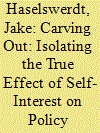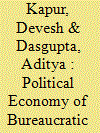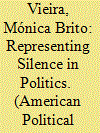|
|
|
Sort Order |
|
|
|
Items / Page
|
|
|
|
|
|
|
| Srl | Item |
| 1 |
ID:
175289


|
|
|
|
|
| Summary/Abstract |
Autocrats confront a number of threats to their power, some from within the regime and others from foreign actors. To understand how these threats interact and affect autocratic survival, we build a model where an autocratic leader can be ousted by a domestic opposition and a foreign actor. We concentrate on the impact that foreign threats have on the stability of autocratic leadership and show that the presence of foreign threats increases the probability an autocrat retains power. Focusing on two cases, one where a foreign actor and the domestic opposition have aligned interests and one where their interests are misaligned, we elucidate two distinct mechanisms. First, when interests are aligned, autocrats are compelled to increase domestic security to alleviate international pressure. Second, when interests are misaligned, autocrats exploit the downstream threat of foreign intervention to deter domestic threats. We also show that autocrats have incentives to cultivate ideological views hostile to broader interests among politically influential domestic actors.
|
|
|
|
|
|
|
|
|
|
|
|
|
|
|
|
| 2 |
ID:
175291


|
|
|
|
|
| Summary/Abstract |
Wedges and frames, two much-studied strategies of American political combat, are generally thought to be partisan weapons, meant to manipulate voters into making trade-offs that favor the political actor wielding them. My inquiry here explores whether there exists anything comparably schematic to wedges and frames at work in attempts by American politicians not to polarize but to find consensus, not to cater to extremes but moderate them. Despite the seeming paucity of such efforts in American public discourse, there is one such common and as-yet untheorized scheme, which uses the two issue positions involved in wedges to overcome the ill effects of reframing and the two value dimensions involved in reframing to overcome the ill effects of wedges. I elaborate this discursive structure by examining its presence in a number of American political debates, showing how it differs from other contemporary normative-theoretic frameworks for understanding compromise in American politics.
|
|
|
|
|
|
|
|
|
|
|
|
|
|
|
|
| 3 |
ID:
175280


|
|
|
|
|
| Summary/Abstract |
Research on clientelism emphasizes the use of brokers to mobilize voters. To utilize these agents efficiently, politicians must learn about brokers’ relative abilities and allocate scarce resources accordingly. Drawing upon a hand-coded dataset based on the archives of Gustavo Capanema, a powerful mid-twentieth-century congressman from Minas Gerais, Brazil, this paper offers the first direct evidence of such learning dynamics. The analysis concentrates on Brazil’s pre-secret ballot era, a time when measuring broker performance was particularly straightforward. Consistent with theories of political learning, the data demonstrate that resource flows to local machines were contingent on the deviation between actual and expected votes received in previous elections. Moreover, given politicians’ ability to discern mobilization capacity, payments to brokers were highly effective in bringing out the vote.
|
|
|
|
|
|
|
|
|
|
|
|
|
|
|
|
| 4 |
ID:
175281


|
|
|
|
|
| Summary/Abstract |
How important is self-interest in people’s opinions about public policy? If a policy proposal exempts a subset of the target group from costs that others will have to pay, or denies them benefits that others will enjoy, do they respond according to self-interest? This experimental study distinguishes between true self-interest and affinity for one’s in-group by exploiting a common feature of policy proposals: age-based “carve-outs” that prevent otherwise similar subgroups of a population from being affected by the benefits or burdens of a new policy (e.g., cuts to an old-age program that exempt people above a certain age). I find self-interest effects for older Americans exempt from cuts to Medicare and younger people too old to benefit from a hypothetical student debt relief program. These effects vary in ways that are consistent with extant theory.
|
|
|
|
|
|
|
|
|
|
|
|
|
|
|
|
| 5 |
ID:
175284


|
|
|
|
|
| Summary/Abstract |
Motivated by recent developments in cyberwarfare, we study deterrence in a world where attacks cannot be perfectly attributed to attackers. In the model, each of attackers may attack the defender. The defender observes a noisy signal that probabilistically attributes the attack. The defender may retaliate against one or more attackers and wants to retaliate against the guilty attacker only. We note an endogenous strategic complementarity among the attackers: if one attacker becomes more aggressive, that attacker becomes more “suspect” and the other attackers become less suspect, which leads the other attackers to become more aggressive as well. Despite this complementarity, there is a unique equilibrium. We identify types of improvements in attribution that strengthen deterrence—namely, improving attack detection independently of any effect on the identifiability of the attacker, reducing false alarms, or replacing misidentification with non-detection. However, we show that other improvements in attribution can backfire, weakening deterrence—these include detecting more attacks where the attacker is difficult to identify or pursuing too much certainty in attribution. Deterrence is improved if the defender can commit to a retaliatory strategy in advance, but the defender should not always commit to retaliate more after every signal.
|
|
|
|
|
|
|
|
|
|
|
|
|
|
|
|
| 6 |
ID:
175272


|
|
|
|
|
| Summary/Abstract |
“Dissident minorities” are members of marginalized groups who dissent from the consensus group position on matters seen as critical to their group’s collective liberation. This paper articulates the distinctive political status—powers, vulnerabilities, and obligations—of dissident minorities. Dissident minorities may be especially vulnerable to slurs or ostracism as “self-hating.” But they also can wield significant public influence by positioning themselves as exceptional and exemplary members of their group. Both the powers and vulnerabilities of dissident minorities, in turn, converge around the prospect of “tokenization”—the use of the dissident minority’s dissident opinion by majority group actors as a means of discharging a stipulated obligation to engage with the minority group writ large. While dissident minorities should be free to hold and advocate for their divergent positions in public spaces, they retain a distinctive obligation to not offer themselves out as adequate replacements for engagement with the broader group.
|
|
|
|
|
|
|
|
|
|
|
|
|
|
|
|
| 7 |
ID:
175288


|
|
|
|
|
| Summary/Abstract |
Does political affirmative action undermine or promote development? We present the first systematic analysis of Scheduled Areas in India, home to 100 million citizens, where local political office is reserved for the historically disadvantaged Scheduled Tribes. A newly constructed dataset of 217,000 villages allows us to probe conflicting hypotheses on the implementation of the world’s largest workfare program, the National Rural Employment Guarantee Scheme. We find that reservations deliver no worse overall outcomes, that there are large gains for targeted minorities, and that these gains come at the cost of the relatively privileged, not other minorities. We also find improvements in other pro-poor programs, including a rural roads program and general public goods. Reservations more closely align benefits to each group’s population share, allaying concerns of overcompensation for inequalities. Contrary to the expectations of skeptics, results indicate that affirmative action can redistribute both political and economic power without hindering overall development.
|
|
|
|
|
|
|
|
|
|
|
|
|
|
|
|
| 8 |
ID:
175287


|
|
|
|
|
| Summary/Abstract |
Homeowners and renters have participated in politics at different rates throughout American history, but does becoming a property owner motivate an individual to participate in local politics? I combine deed-level property records in California and Texas with an original dataset on individual comments in local city council meetings to study the role of property ownership in shaping costly forms of political behavior, and I document large inequalities in who participates at city council meetings. I also link property records to individual-level contribution records and administrative voter files and find that becoming a property owner increases an individual’s political activity. Over and above voting in local elections, property ownership motivates individuals to participate in local city council meetings and donate to candidates. These findings illustrate how the experience of homeownership leads property owners to become much more active in local politics.
|
|
|
|
|
|
|
|
|
|
|
|
|
|
|
|
| 9 |
ID:
175290


|
|
|
|
|
| Summary/Abstract |
Treatments of collective action in political science, classical Greek history, and democratic theory often focus on the episodic and public-facing dimensions of dissent. This article turns to Aristotle for an account of solidaristic political action whose scale and tempo is sometimes obscured by such engagements. Revisiting The Athenian Constitution’s account of the tyrannicides of 514 BCE and the democratic revolution of 508/7 BCE, I argue for the centrality of comradeship to Aristotle’s discussions of these episodes. I demonstrate that Aristotle’s attention to the politics of comradeship is also legible in Politics 5—which notes the dangers political clubs (hetaireiai) pose to tyranny—as well as Aristotle’s references to comrades (hetairoi) in the Nicomachean and Eudemian Ethics. This article contributes to our understanding of the birth of Athenian democracy and how comradeship—a vice, to Aristotle, under ordinary political circumstances—becomes a virtue.
|
|
|
|
|
|
|
|
|
|
|
|
|
|
|
|
| 10 |
ID:
175277


|
|
|
|
|
| Summary/Abstract |
Can gender-based “enclaves” facilitate women’s access to justice? I examine all-female police stations in India and test whether group-specific institutions assist victims of gender-based violence and female officers in law enforcement. I create an original dataset based on Indian police reports and leverage the manner in which all-women police stations were opened in Haryana state to estimate their causal effect. The creation of enclaves in law enforcement does not increase registered crime. In fact, the intervention lowers the caseload at standard stations by justifying the deflection of gendered crimes, reduces responsibilities for policewomen, and increases travel cost for victims seeking redress. The institutions formalize the “counseling” of victims by encouraging reconciliation with abusers at the expense of arrest of suspects, and survey evidence suggests that all-women stations might not be associated with positive perceptions of policewomen. Broadly, I argue that representation as separation may have unintended consequences.
|
|
|
|
|
|
|
|
|
|
|
|
|
|
|
|
| 11 |
ID:
175285


|
|
|
|
|
| Summary/Abstract |
When forming opinions, mass publics may implicitly or explicitly value some people’s well-being more than others. Here we examine how two forms of this phenomenon—ethnocentric valuation and moral exclusion—affect attitudes toward international trade. We hypothesize that attitudes toward competition and believing that trade is a competition moderate the extent of ethnocentric valuation and moral exclusion; although all citizens value their co-nationals’ livelihoods systematically more than those of people in trading partner countries, greater ethnocentric valuation and moral exclusion occur when trade is seen as a competition and when individuals hold more positive attitudes toward competition.
|
|
|
|
|
|
|
|
|
|
|
|
|
|
|
|
| 12 |
ID:
175276


|
|
|
|
|
| Summary/Abstract |
How can societies restrain their coercive institutions and transition to a more humane criminal justice system? We argue that two main factors explain why torture can persist as a generalized practice even in democratic societies: weak procedural protections and the militarization of policing, which introduces strategies, equipment, and mentality that treats criminal suspects as though they were enemies in wartime. Using a large survey of the Mexican prison population and leveraging the date and place of arrest, this paper provides causal evidence about how these two explanatory variables shape police brutality. Our paper offers a grim picture of the survival of authoritarian policing practices in democracies. It also provides novel evidence of the extent to which the abolition of inquisitorial criminal justice institutions—a remnant of colonial legacies and a common trend in the region—has worked to restrain police brutality.
|
|
|
|
|
|
|
|
|
|
|
|
|
|
|
|
| 13 |
ID:
175286


|
|
|
|
|
| Summary/Abstract |
We develop and estimate a model of learning that accounts for the observed correlation between economic development and democracy and for the clustering of democratization events. In our model, countries’ own and neighbors’ past experiences shape elites’ beliefs about the effects of democracy on economic growth and their likelihood of retaining power. These beliefs influence the choice to transition into or out of democracy. We show that learning is crucial to explaining observed transitions since the mid-twentieth century. Moreover, our model predicts reversals to authoritarianism if the world experienced a growth shock the size of the Great Depression.
|
|
|
|
|
|
|
|
|
|
|
|
|
|
|
|
| 14 |
ID:
175278


|
|
|
|
|
| Summary/Abstract |
For decades, political scientists have argued that competition is a fundamental component of a responsible party system, such that when one party dominates politics, legislative coalitions destabilize and democratic accountability suffers. In this paper, I evaluate these predictions in an important but largely unexplored legislative environment: American local government. Using an original collection of roll-call records from 151 municipal councils, I show that legislative behavior is more one-dimensional when elections are partisan and the electorate is evenly balanced between the parties. When either of these features is absent, however, elite behavior remains unstructured, with coalitions shifting over time and across issues. These differences across institutional and competitive contexts suggest that partisan elections—and the party organizations that nearly always come with them—are critical for translating electoral insecurity into organized government, raising questions about the capacity for electoral accountability in a growing set of one-party dominant governments across the country.
|
|
|
|
|
|
|
|
|
|
|
|
|
|
|
|
| 15 |
ID:
175282


|
|
|
|
|
| Summary/Abstract |
For decades, critics of pluralism have argued that the American interest group system exhibits a significantly biased distribution of policy preferences. We evaluate this argument by measuring groups’ revealed preferences directly, developing a set of ideal point estimates, IGscores, for over 2,600 interest groups and 950 members of Congress on a common scale. We generate the scores by jointly scaling a large dataset of interest groups’ positions on congressional bills with roll-call votes on those same bills. Analyses of the scores uncover significant heterogeneity in the interest group system, with little conservative skew and notable inter-party differences in preference correspondence between legislators and ideologically similar groups. Conservative bias and homogeneity reappear, however, when weighting IGscores by groups’ PAC contributions and lobbying expenditures. These findings suggest that bias among interest groups depends on the extent to which activities like PAC contributions and lobbying influence policymakers’ perceptions about the preferences of organized interests.
|
|
|
|
|
|
|
|
|
|
|
|
|
|
|
|
| 16 |
ID:
175293


|
|
|
|
|
| Summary/Abstract |
Government programs often fail on the ground because of poor implementation by local bureaucrats. Prominent explanations for poor implementation emphasize bureaucratic rent-seeking and capture. This article documents a different pathology that we term bureaucratic overload: local bureaucrats are often heavily under-resourced relative to their responsibilities. We advance a two-step theory explaining why bureaucratic overload is detrimental to implementation as well as why politicians under-invest in local bureaucracy, emphasizing a lack of electoral incentives. Drawing on a nationwide survey of local rural development officials across India, including time-usage diaries that measure their daily behavior, we provide quantitative evidence that (i) officials with fewer resources are worse at implementing rural development programs, plausibly because they are unable to allocate enough time to managerial tasks and (ii) fewer resources are provided in administrative units where political responsibility for implementation is less clear. The findings shed light on the political economy and bureaucratic behavior underpinning weak local state capacity.
|
|
|
|
|
|
|
|
|
|
|
|
|
|
|
|
| 17 |
ID:
175279


|
|
|
|
|
| Summary/Abstract |
The credibility of election outcomes hinges on the accuracy of vote tallies. We provide causal evidence on the drivers and the downstream consequences of variation in the quality of vote tallies. Using data for the universe of polling stations in Mexico in five national elections, we document that over 40% of polling-station-level tallies display inconsistencies. Our evidence strongly suggests these inconsistencies are nonpartisan. Using data for more than 1.5 million poll workers, we show that lower educational attainment, higher workload, and higher complexity of the tally cause more inconsistencies. Finally, using an original survey of close to 80,000 poll workers together with detailed administrative data, we find that inconsistencies cause recounts and recounts lead to lower trust in electoral institutions. We discuss policy implications.
|
|
|
|
|
|
|
|
|
|
|
|
|
|
|
|
| 18 |
ID:
175273


|
|
|
|
|
| Summary/Abstract |
Democratic representation focuses on voice: it conceives voice as that which is represented and as the prime mode of representing. This article argues that this focus is problematic and turns instead to silence to ask a fundamental question: Can representation empower citizens from their silent positions? I approach the question in three parts. First, I offer a new conceptualization of silence, arguing that silence is best understood as the site of a potential or actual presence. Second, I use criteria of domination and displaced involvement to assess attempts to enfranchise silence within the transmission-belt model of representation. Third, I critically engage and strengthen constructivist views of representation by developing these criteria to assess the legitimacy of claims to represent—speak about and for—silent constituencies—namely, the claim to represent an (alleged) silent majority.
|
|
|
|
|
|
|
|
|
|
|
|
|
|
|
|
| 19 |
ID:
175275


|
|
|
|
|
| Summary/Abstract |
Rival causal and interpretive approaches to explaining social phenomena have important ethical differences. While human actions can be explained as a result of causal mechanisms, as a meaningful choice based on reasons, or as some combination of the two, it is morally important that social scientists respect others by recognizing them as persons. Interpretive explanations directly respect their subjects in this way, while purely causal explanations do not. Yet although causal explanations are not themselves expressions of respect, they can be used in respectful ways if they are incorporated into subjects’ self-directed projects. This can occur when subjects correctly understand and freely adopt researchers’ goals through a process of informed consent. It can also occur when researchers correctly understand and adopt their subject’s goals, using their research to empower those they study.
|
|
|
|
|
|
|
|
|
|
|
|
|
|
|
|
| 20 |
ID:
175283


|
|
|
|
|
| Summary/Abstract |
Party elites in coalition governments are acutely aware that the deals they strike will be critically evaluated by their supporters, and that they risk losing support if they are perceived as ineffective negotiators. This has a powerful influence on the bargains parties strike. Because most supporters are unaware of the complex aspects of bargains and instead rely on simple heuristics to evaluate their most visible features, parties have incentives to meet supporter expectations primarily on easily observable outcomes. To do so, they make trade-offs on less observable outcomes. This implies that the more visible features of a bargain typically do not accurately reflect the relative success of parties in coalition negotiations. We evaluate our argument using original data on the office rewards and policy risks of portfolio allocation in 16 parliamentary democracies. Our findings support our argument, and they have important implications for the nature of representation under multiparty government.
|
|
|
|
|
|
|
|
|
|
|
|
|
|
|
|
|
|
|
|
|